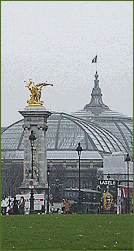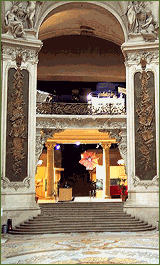|
Although it was only meant to be a temporary exhibition, due to
the vast number of people who attended, which was well over two million, it became a
permanent museum and still occupies the same part of the Grand Palais today. And
Jean Perrin wanted this educational museum to be able to demonstrate to the general public
and scientists alike that science has played a major role in our lives and it is only
through research and discovery that civilisation can change.
But it was not until 1990 that the Palais de la Decouverte came under the jurisdiction of
the Ministry of National Education and Research and Technology, which means that it is now
directed by scientists with the aim of educating its visitors through the use of
exhibitions, lectures, interactive experiments, demonstrations and workshops both for
adults and children. In fact a recent survey showed that around 50% of the major
scientists in France had been inspired through their visits to the science museum during
their younger years!
This museum has all you could ever want to know about science and has most of the old and
elaborate physical demonstrations left in place that still actually work, but there are
also a lot of new and very interesting interactive experiments for everyone to enjoy.
There are 30 individual amphitheatres within the museum, and each one is different, with
the focus being on real science and contact with real scientists who conduct the
demonstrations, talks, etc and after the demonstrations they will explain what you have
just seen and answer any questions, which makes the science understandable for anyone but
you find that people often linger afterwards to find out even more in-depth.
Visitors can watch the sky and astronomic phenomena in the museum planetarium as the
Palais de la Decouverte also has a planetarium made of a 15m-diameter cupola on which the
night-sky and all celestial phenomena are presented. Although there is an additional
fee for the planetarium it is well worth it and there are several different programs that
last around 45 minutes each. The Space Odyssey of Ariane V is a digitally projected
simulation of two space missions presented in 3D.
There is also an electrostatic demonstration presented by a Professor at the Palais de la
Découverte, that demonstrates the more violent behaviours of nature and which brings to
life the 2nd most powerful force in our universe, after nuclear power, and is a very
popular 'electric' show.
There are lots of permanent exhibitions, such as Voyage Into The Cell, which is a 3D film
that takes you into the middle of a cell to discover its complexity and the Questions of
Atmosphere, which deals with the concerns of meteorology, climate and problems relating to
the o-zone.
As you may have realised this is a great museum with a hands-on approach to science for
children and adults alike and with experiments, working models and videos along with
scientific and technological exhibits on topics like optics, biology and nuclear physics,
you will not fail to enjoy the whole experience.
There are also workshops available for a charge in Chemistry, Astronomy, Astrophysics,
Mathematics, Geo-Sciences, Life Sciences and Physics, but it is advisable to check on
these prior to your visit, plus please note that the demonstrations are always held at
specific times during the day and there are around 60 talks and demonstrations conducted
every day!
Group tours, guided tours and conferences can be arranged if booked in advance.
There is a bookshop, gift shop and restaurant and as with quite a few museums in Paris, photography is allowed.
The Palais de la Découverte is open every day of the week except for a Monday and on
national holidays from 9.30am through to 6pm. However on a Sunday it does not close
until 6.30pm.
Address & Contact Details:
Palais de la Découverte
Avenue Franklin-Roosevelt
75008
Paris
Telephone: 1 56 43 20 20 or 1 56 43 20 21
|
|



